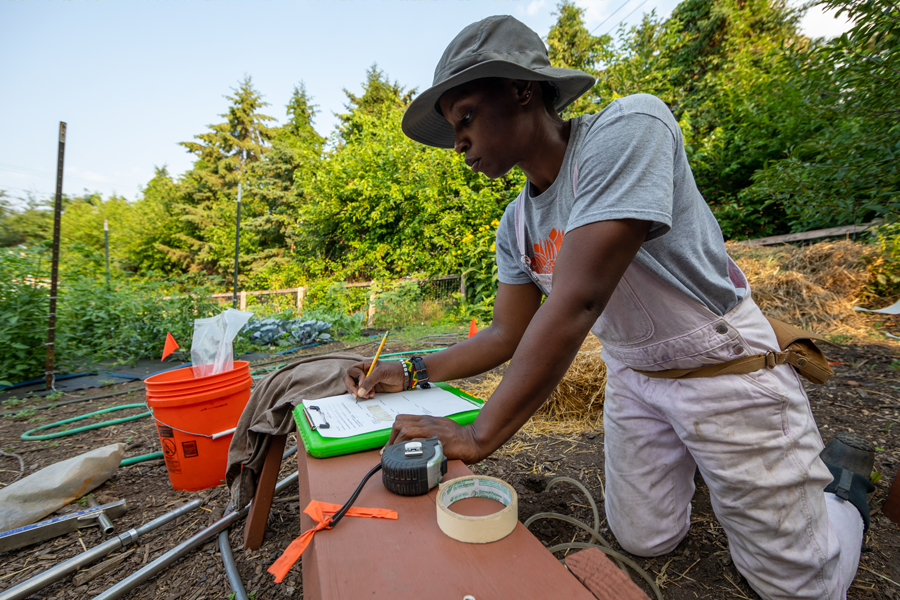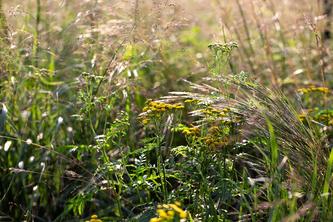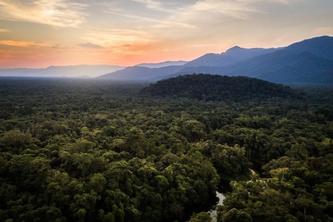
“One of the most radical and revolutionary things you can do is grow your own food and eat from the land,” says Tiffany LaShae, a master’s student in the Graduate Program in Land and Atmospheric Science (LAAS) at the College of Food, Agricultural and Natural Resource Sciences.
Just 2 percent of farmers in the United States are Black, and LaShae is a leader among them. A vegetable farmer, food justice activist, and soil health educator, LaShae is empowering farmers of color and activating white allies throughout the Midwest and the country.
In February, LaShae and her U of M colleagues led a daylong Farmers Against Racism workshop, a professional development option for attendees of the Midwest Organic & Sustainable Education Service (MOSES) Organic Farming Conference in La Crosse, WI.
The workshop laid bare the violent and traumatic history of agriculture in the United States, from land theft and genocide of Indigenous peoples by European colonizers to enslavement of African peoples and the plantation slave economy of the American colonies (and later the United States). This legacy also includes discriminatory practices codified by private institutions such as banks and governmental agencies like the USDA, and the exploitation of migrant agricultural laborers that persists today.
Farmers Against Racism was informed by LaShae’s personal experience of being a Black farmer and a woman in agriculture, and the barriers that she and her community continue to encounter.
LaShae has worked with MOSES on a project to support the success of Black, Indigenous, and people of color (BIPOC), part of their Farmer Advancement initiative. She also hosted a podcast called In Her Boots, highlighting the work of women and BIPOC in agriculture. According to LaShae, “MOSES is really trying to do the difficult work” of antiracism in an industry that still has room for improvement.
An awakening, and cultural connections to soil
Originally from Texas, LaShae’s roots in food and farming were born out of the realization that her family and community were experiencing nutrition-related diseases, and they didn’t have easy access to fresh vegetables. “The majority of the people around me were suffering,” she says, “and at the time I didn't know why.”
She uses the term “food apartheid,” rather than “food desert,” to describe the setting. “This is an area on the south side of Dallas that was redlined,” she explains. The effects of redlining—a discriminatory and oppressive lending and urban planning policy in place in the 1930s through the 1960s—are still felt today; proximity to grocery stores can be one such effect.
Making the connection between heath, nutrition, and growing food was a pivotal moment for LaShae: “That's when the light switch was flipped, and I discovered all of the things that are associated with healthy foods in our communities.” She got involved with urban farming and community gardens, which led to organizations advocating for food and climate justice.
She spent the next decade developing her skills as a vegetable farmer across the country. When the growing seasons ended in the U.S., LaShae spent winters in Africa, partnering with nonprofits to support farmers in rural villages. “These were folks whose survival depends on the health of their soil,” she says.
While working as the farm manager of Frogtown Farm in St. Paul, LaShae met Nic Jelinski, a soil scientist and faculty member in the Department of Soil, Water, and Climate. According to LaShae, Jelinski “shares this passion of going beyond the quantitative aspects of soil, looking deeper into relationships and connections between communities and soil.”
Under his mentorship, LaShae began working towards her master’s degree in LAAS last year. She plans to explore the connections between farmer knowledge, practice, and soil health, with a focus on Black farmers across the United States.
LaShae grows crops that are culturally important to the Black community with roots in Africa, including collard greens, okra, and yams. She plans to continue leading antiracism workshops in the predominantly white spaces of agriculture and higher education, while uplifting BIPOC farmers and stewards of the soil.
“We all should be equipped with the knowledge of our agricultural history and learn how to not continue the exploitation,” LaShae says.
- Categories:
- Agriculture and Environment
- Food
- Soil





